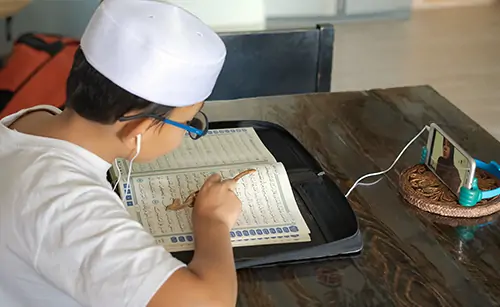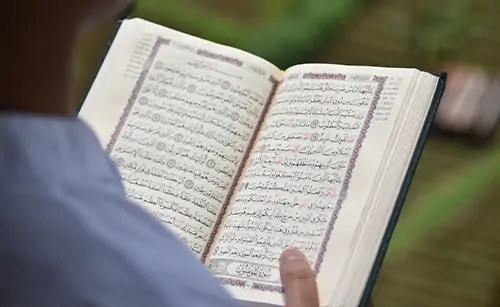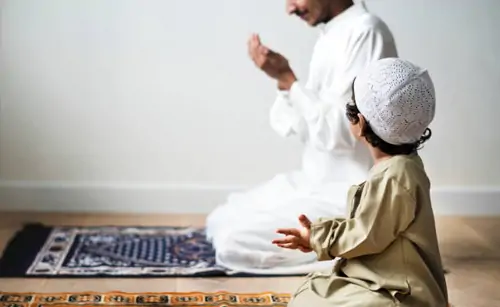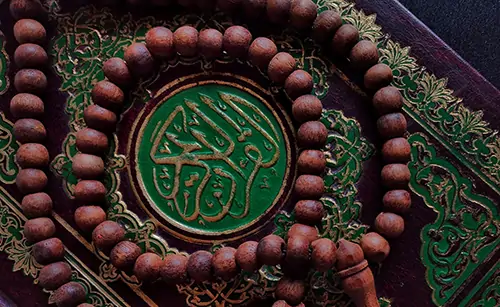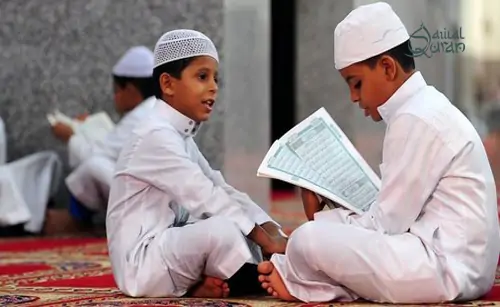La Hawla Wala Quwwata illa Billah – Meaning, Benefits, and Powerful Dua Explained

There are moments in life when one feels powerless — when struggles seem too heavy and strength feels distant. In such times, the hearts of believers turn to a short yet deeply powerful phrase: “La hawla wala quwwata illa billah” (لَا حَوْلَ وَلَا قُوَّةَ إِلَّا بِاللَّهِ). This beautiful dua is more than just words — it is a reminder of where true strength lies and a source of endless hope.
Through the generations, Muslims have repeated this dua in times of hardship and ease, making it one of the most beloved phrases in Islam. Let’s explore its meaning, its Quranic and Hadith references, and how it shapes the believer’s daily life.
What Does “La Hawla Wala Quwwata Illa Billah” Mean?
The phrase “La hawla wala quwwata illa billah” is often translated as:
“There is no power and no strength except with Allah.”
- La hawla (لَا حَوْلَ) means “there is no might” or “no ability to change.”
- Wala quwwata (وَلَا قُوَّةَ) means “and no strength.”
- Illa billah (إِلَّا بِاللَّهِ) means “except with Allah.”
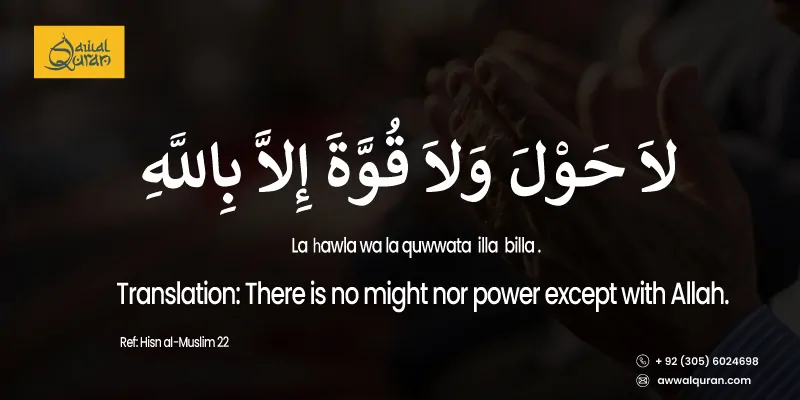
Put together, the dua means that no one can move from one state to another — from weakness to strength, from sin to obedience, from hardship to ease — without the help of Allah (SWT). It is a declaration of humility and complete reliance upon Him.
This powerful dua is sometimes recited in its longer form:
“La hawla wala quwwata illa billahil aliyyil azim”
(لَا حَوْلَ وَلَا قُوَّةَ إِلَّا بِاللَّهِ الْعَلِيِّ الْعَظِيمِ)
– Meaning “There is no power and no strength except with Allah, the Most High, the Most Great.”
Quranic Perspective: Power Belongs Only to Allah
While the phrase itself does not appear verbatim in the Quran, its meaning is deeply rooted in many verses. Allah reminds us repeatedly that strength, might, and control all belong to Him alone:
“And to Allah belongs all might and to His Messenger and to the believers…”
(Surah Al-Munafiqun 63:8)
This verse captures the spirit of la hawla wala quwwata illa billah: power and ability are not ours — they are gifts from Allah. When a believer utters this dua, they acknowledge that everything in life — success, patience, victory, forgiveness — depends entirely on His will.
What the Prophet ﷺ Said About This Dua
The Messenger of Allah ﷺ highly recommended this phrase. In many authentic ahadees, he described la hawla wala quwwata illa billah as one of the most beloved and powerful forms of remembrance.
In one narration, the Prophet ﷺ said:
“Shall I not tell you about a phrase which is one of the treasures of Paradise? It is: ‘La hawla wala quwwata illa billah.’”
(Sahih al-Bukhari 6384, Sahih Muslim 2704)
This hadith shows that repeating this short dua brings immense reward and opens the doors to Jannah (Paradise). It is not just a sentence — it is a key to contentment and strength.
The Importance of This Dua in Daily Life
Every believer faces times of weakness — moments when effort seems pointless and problems seem too big. La hawla wala quwwata illa billah serves as a lifeline in those moments.
Here’s how Muslims incorporate this dua into daily life:
- When facing challenges: Whispering this phrase reminds the heart that only Allah can grant strength and resolve.
- After prayers: Many recite it after Salah, as part of dhikr, to seek divine support.
- During temptation: Saying it when resisting sin reinforces the idea that strength to obey comes only from Allah.
- In supplication: It’s often included in duas, especially when asking for help, patience, or guidance.

It is also mentioned alongside other powerful adhkar like “Mashallah la quwwata illa billah”, highlighting the same truth — everything happens by Allah’s will and strength.
Deep Spiritual Meaning: A Statement of Tawheed and Trust
At its core, la hawla wala quwwata illa billah is a statement of tawheed (oneness of Allah). It shifts the believer’s mindset from self-reliance to complete trust in Allah. It teaches humility — that no matter how strong or capable one feels, all power ultimately belongs to the Creator.
It- also relieves anxiety. By surrendering control to Allah, the believer frees themselves from the illusion of total control and places trust where it truly belongs.
Benefits of Reciting “La Hawla Wala Quwwata Illa Billah”
The blessings of this dua are countless. Some of the well-known benefits include:
- Spiritual strength: It revives the heart and strengthens faith.
- Protection from hardship: It acts as a shield against despair and hopelessness.
- Forgiveness: It is a form of dhikr that leads to Allah’s mercy.
- Closeness to Allah: Frequent recitation increases taqwa and reliance on Him.
- Reward of Paradise: As the Prophet ﷺ said, it is one of the treasures of Jannah.
How and When to Recite This Dua
There is no fixed time or number for reciting la hawla wala quwwata illa billah. It can be said anytime, anywhere — during difficulty, after prayer, in dhikr circles, or quietly in one’s heart.
It is also part of longer duas like:
“La hawla wala quwwata illa billahil aliyyil azim.”
Some believers use it as a response to bad news, while others recite it to remind themselves that Allah is in control.
A Small Phrase, A Great Power
This dua may be short, but its message is profound. It carries within it the entire philosophy of Islam: all power belongs to Allah, and humans are but His servants. Whenever life overwhelms, this phrase brings peace, strength, and reassurance.
Discover More Powerful Duas
If this dua inspires you, explore many more authentic duas and kalimas on our Dua Page. Each one carries wisdom and blessings that enrich a Muslim’s daily life.
Conclusion
La hawla wala quwwata illa billah is more than a phrase — it is a life philosophy. It reminds believers that strength does not lie within themselves but flows from Allah, the Most High, the Most Great. By reciting it often and understanding its depth, one strengthens their faith and builds a heart that relies solely on its Creator.
Frequently Asked Questions (FAQs)
What does “La Hawla Wala Quw wata illa Billah” mean?
It means “There is no power and no strength except with Allah.” It reminds believers that only Allah controls all things and grants the strength to act.
Where is “La Hawla Wala Quwwata illa Billah” mentioned in the Quran?
While the phrase itself is not directly in the Quran, its meaning is reflected in many verses about Allah’s power and might, such as Surah Al-Munafiqun (63:8).
Why did the Prophet ﷺ call this dua a treasure of Paradise?
Because it reflects humility, tawheed, and complete reliance on Allah. It’s a powerful dhikr that carries immense spiritual reward.
When should a Muslim recite this dua?
It can be recited at any time — during hardship, after salah, when resisting sin, or simply as part of daily dhikr.
What are the benefits of reciting “La Hawla Wala Quw wata illa Billah”?
It brings inner peace, strengthens faith, earns reward, protects from despair, and draws the believer closer to Allah.







